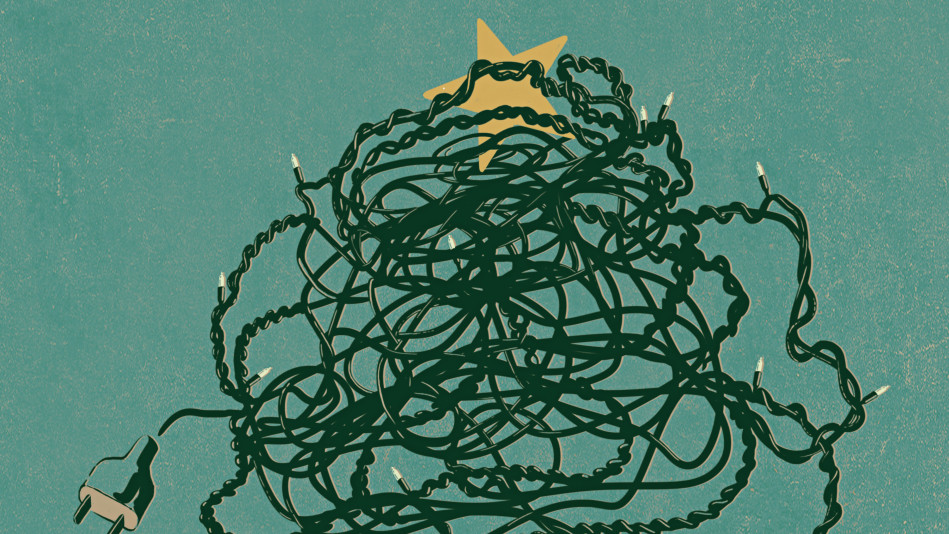How to Beat Sadness During the Holidays
If you’re feeling gloomy about the holiday season, Martha Beck has some illuminating advice.

Illustrations: Carlo Giambaresi
“Blue Christmas” isn’t just an Elvis song. Many of us tend to despair during the holidays—and here’s an unsettling factoid: More people die in the ER on Christmas or New Year’s Day than any other dates on the calendar. People also get depressed and die during Hanukkah, Kwanzaa, and Pancha Ganapati (the December celebration of the elephant-headed Hindu deity, Ganesha), but epidemiologically, Christmas takes the fruitcake. Can I get a “Bah, humbug”?
The grand pooh-bah of the holiday haters is Ebenezer Scrooge, of course. This season we’ll encounter a million versions of A Christmas Carol, the story of that mean old man who comes to repent his wicked ways. But many of them will leave out the sophisticated psychology of Dickens’s original, which isn’t just a heartwarming tale. It’s a guide to living happily throughout December and beyond.
Scrooge has good reasons for despising the season, as we learn when the Ghost of Christmas Past leads him back to his wretched boyhood of neglect and loss. Anyone who’s had a less than happy childhood can probably relate; there’s something about the season of joy that has a way of making us miserable, reminding us of our flawed families, unhealed wounds, and fa la la la la. We may clench our jaws and go through the motions, or sit out the holiday entirely.
However, an unhappy childhood isn’t Scrooge’s real problem, which can be found in a couple of lines you may not even remember. It’s the scene where young Ebenezer’s true love dumps him (on Christmas—just to punch up the holiday depression statistics). The erstwhile girlfriend offers an insight that can help us all beat the seasonal blues: “You fear the world too much. All your other hopes have merged into the hope of being beyond the chance of its sordid reproach.”
Scrooge is closing up like a fist, hardening himself against loneliness—and also against love. His unhappy fate is sealed not by his early trauma, but by his fearful response to it. He chooses isolation over connection, which only leaves him more isolated. He’ll always associate Christmas with pain, but his hatred isn’t about the season. It’s about his fear of the world, which rules him all year long.
Scrooge doesn’t consider himself a tyrant. He thinks anger and stinginess are reasonable responses to the hand fate has dealt him. No one considers herself the Scrooge of her own story; I can’t count the number of times I’ve heard clients defend their destructive behaviors with “I’m scared!” I get it. But when we project a cruel universe, we become its victims. As the Ghost of Christmas Yet to Come reveals, hate and greed can’t protect Ebenezer, who winds up in a lonely grave.
When we act out of fear, we, too, create what we dread most. We feel vulnerable in a relationship, so we clam up, which drives away the one we love. We’re afraid other people won’t like us—and to prove we don’t care what they think, we become as unlikable as possible. We brace ourselves for a miserable holiday, and we sour it for ourselves and everyone around us.

Fortunately, bitterness isn’t our only option. When we have the courage to open up to life, no matter how much pain we’ve experienced, we open up to joy. Even at the scariest times, we can choose love—and that, too, becomes a self-fulfilling prophecy.
When old Ebenezer awakens after his ghostly visitations, he still has reasons to hate Christmas. He can’t erase his traumas, and he knows he’s earned the world’s sordid reproach. But instead of bemoaning the past or dreading what’s yet to come, he (forgive me) opens the Christmas present. He comes home to now, the only moment when he can make things go right, with a receptive heart. And so can we.
We don’t have to think about surviving the entire holiday season; we just have to live in the moment that’s right in front of us. Then, no matter how we feel—happy, resentful, hopeless—we can offer ourselves unconditional compassion and acceptance. When we give ourselves the present, we find it easier to give to the people around us. And before we know it, we discover that peace and joy aren’t as far away as we thought.
The first thing Scrooge feels when the ghost brings him back to the present is gratitude. Here again Dickens is giving us good therapy: In one famous study, people who wrote a letter of gratitude and delivered it to the recipient experienced an enormous boost in happiness and well-being that lasted a month. Maybe we can all make December that month by writing and delivering a gratitude letter ourselves. Research shows that gratitude is a powerful, simple way to give ourselves mental and even physical health—the very things we need most to get through this festive season of depression and death.
So go ahead, open your present. And God bless us, every one.
Martha Beck is the author of, most recently, Diana, Herself: An Allegory of Awakening.
The grand pooh-bah of the holiday haters is Ebenezer Scrooge, of course. This season we’ll encounter a million versions of A Christmas Carol, the story of that mean old man who comes to repent his wicked ways. But many of them will leave out the sophisticated psychology of Dickens’s original, which isn’t just a heartwarming tale. It’s a guide to living happily throughout December and beyond.
Scrooge has good reasons for despising the season, as we learn when the Ghost of Christmas Past leads him back to his wretched boyhood of neglect and loss. Anyone who’s had a less than happy childhood can probably relate; there’s something about the season of joy that has a way of making us miserable, reminding us of our flawed families, unhealed wounds, and fa la la la la. We may clench our jaws and go through the motions, or sit out the holiday entirely.
However, an unhappy childhood isn’t Scrooge’s real problem, which can be found in a couple of lines you may not even remember. It’s the scene where young Ebenezer’s true love dumps him (on Christmas—just to punch up the holiday depression statistics). The erstwhile girlfriend offers an insight that can help us all beat the seasonal blues: “You fear the world too much. All your other hopes have merged into the hope of being beyond the chance of its sordid reproach.”
Scrooge is closing up like a fist, hardening himself against loneliness—and also against love. His unhappy fate is sealed not by his early trauma, but by his fearful response to it. He chooses isolation over connection, which only leaves him more isolated. He’ll always associate Christmas with pain, but his hatred isn’t about the season. It’s about his fear of the world, which rules him all year long.
Scrooge doesn’t consider himself a tyrant. He thinks anger and stinginess are reasonable responses to the hand fate has dealt him. No one considers herself the Scrooge of her own story; I can’t count the number of times I’ve heard clients defend their destructive behaviors with “I’m scared!” I get it. But when we project a cruel universe, we become its victims. As the Ghost of Christmas Yet to Come reveals, hate and greed can’t protect Ebenezer, who winds up in a lonely grave.
When we act out of fear, we, too, create what we dread most. We feel vulnerable in a relationship, so we clam up, which drives away the one we love. We’re afraid other people won’t like us—and to prove we don’t care what they think, we become as unlikable as possible. We brace ourselves for a miserable holiday, and we sour it for ourselves and everyone around us.

Fortunately, bitterness isn’t our only option. When we have the courage to open up to life, no matter how much pain we’ve experienced, we open up to joy. Even at the scariest times, we can choose love—and that, too, becomes a self-fulfilling prophecy.
When old Ebenezer awakens after his ghostly visitations, he still has reasons to hate Christmas. He can’t erase his traumas, and he knows he’s earned the world’s sordid reproach. But instead of bemoaning the past or dreading what’s yet to come, he (forgive me) opens the Christmas present. He comes home to now, the only moment when he can make things go right, with a receptive heart. And so can we.
We don’t have to think about surviving the entire holiday season; we just have to live in the moment that’s right in front of us. Then, no matter how we feel—happy, resentful, hopeless—we can offer ourselves unconditional compassion and acceptance. When we give ourselves the present, we find it easier to give to the people around us. And before we know it, we discover that peace and joy aren’t as far away as we thought.
The first thing Scrooge feels when the ghost brings him back to the present is gratitude. Here again Dickens is giving us good therapy: In one famous study, people who wrote a letter of gratitude and delivered it to the recipient experienced an enormous boost in happiness and well-being that lasted a month. Maybe we can all make December that month by writing and delivering a gratitude letter ourselves. Research shows that gratitude is a powerful, simple way to give ourselves mental and even physical health—the very things we need most to get through this festive season of depression and death.
So go ahead, open your present. And God bless us, every one.
Martha Beck is the author of, most recently, Diana, Herself: An Allegory of Awakening.



